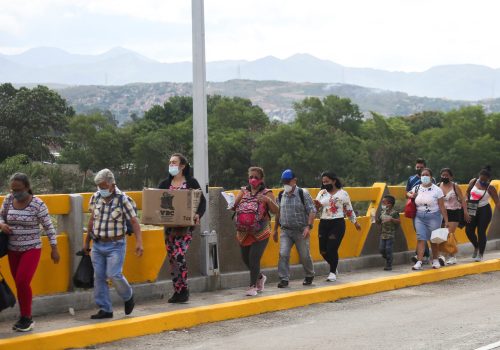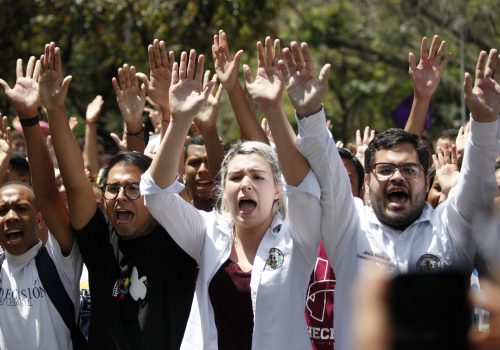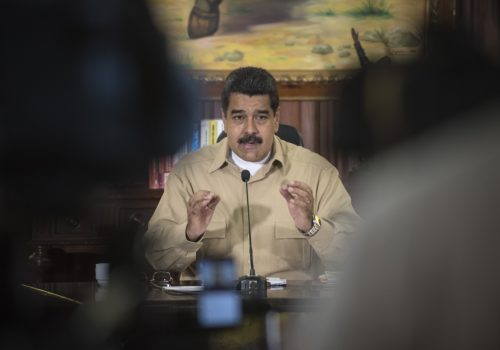Experts react: As the US eases oil sanctions, is Venezuela coming in from the cold?
A pariah no more? The United States on Saturday eased oil sanctions against Venezuelan President Nicolás Maduro’s administration, following the resumption of talks between the Venezuelan government and its political opposition. The Mexico City talks come four years after Maduro’s re-election, which was widely denounced as fraudulent, prompted a political crisis in Venezuela and international isolation of the Maduro regime. The US Treasury Department’s agreement to allow Chevron to expand its joint operations with Venezuela’s state-owned oil company also heralds the potential return of Venezuelan oil to global markets amid an energy crisis sparked by Russia’s invasion of Ukraine.
What’s next for Venezuela? What’s behind the US decision? Our experts drill down on the details.
Jump to an expert reaction:
Iria Puyosa: A win for both Maduro and the opposition, but with strings attached
Érika Rodríguez: What the Venezuelan negotiations mean to Colombia—and the wider region
Diego Area: The evolution of Florida politics helps explain Biden’s shift
There’s a light at the end of the tunnel for Maduro—but only if he follows through on reform
The long-awaited Biden administration decision to peel back oil-sector sanctions is reflective of the new reality in Venezuela. It comes three years after the Trump administration halted all drilling activities as part of a maximum pressure campaign designed to force political change. Maduro, of course, still remains in power, but a new willingness to sit down with the opposition Unitary Platform has now opened the door for limited sanctions relief.
Two important steps to ease the suffering of the Venezuelan people, although still insufficient, provide hope that the country may be turning a corner:
- The announcement of a joint agreement between the Unitary Platform and the Maduro government asking the United Nations (UN) to administer a humanitarian relief program. The program would draw on the approximately three billion dollars in frozen Venezuelan assets that could only be unlocked with agreement by the opposition.
- The resumption of far-reaching political and humanitarian negotiations in Mexico City—stalled for the past year—that include discussions on the 2024 Venezuelan elections.
Why is this happening now? For one, although Maduro has historically used negotiations to stall, without any intention of agreement, this time may be different. The interim government—a US-backed parallel entity led by Juan Guaidó that has failed to provide a viable alternative to Maduro—will cease to exist come January, providing further incentive for a recalibrating opposition to ease up on some of its demands. But the opposition still holds the key to billions of dollars in frozen Venezuelan assets abroad.
For Maduro, who only weeks ago was shaking hands at a UN-sponsored gathering (the climate-change summit, COP27) for the first time in years, the global energy crisis and the renewed focus on containing Russia are twin developments that make him less of a global outlier. He will want to capitalize on that momentum in a bid to get sanctions removed.
Two months ago, seven wrongly detained Americans finally returned home, though more still unfairly languish behind bars in Venezuela.*
Although severely dilapidated, Venezuela holds the world’s largest proven oil reserves, but with production at less than a quarter of what it was a decade ago. In the years to come, and with significant investments, that oil will play a role in alleviating energy pressures.
US domestic politics generally play a role in its policy toward the Western Hemisphere. And Venezuela is no exception. Following the midterms, the clear shift in Florida politics provides political space for the easing of oil-related sanctions. Now that Florida is a reliably Republican state, US policy no longer needs to revolve around the more hard-line interests of voters in the state that is home to over half of Venezuelan immigrants in the United States.
What should we look out for? The US Treasury Department’s issuance of General License 41 is meant to show Maduro that sanctions relief is possible when it makes concrete agreements—that are then monitored and upheld—with the opposition. But the license is only for six months and is limited in scope. Sanctions can also be snapped back at any point. This shows Maduro that there is a light at the end of the tunnel, but that light can be quickly extinguished if he does not act in good faith.
So expect close scrutiny of progress at the negotiation table. In addition, the UN humanitarian relief agreement is a verbal one. If it falls apart in the details, then the re-imposition of sanctions is likely. But if progress continues to be made, the continued easing of oil and other sanctions—first imposed in 2006—is possible.
—Jason Marczak is the senior director of the Atlantic Council’s Adrienne Arsht Latin America Center.
A win for both Maduro and the opposition, but with strings attached
At the beginning of 2022, amid the Russian invasion of Ukraine, the United States approached the Maduro regime for direct talks centered on the liberation of US citizens held as political hostages in Caracas and easing US sanctions to enable Chevron to reactivate its oil operations in Venezuela. These direct talks were widely interpreted as a shift of US policy, which had supported the interim government, headed by Juan Guaidó, as the legitimate Venezuelan government.
Nonetheless, now we are observing a great deal of coordination between the Biden administration and the Venezuelan Unitary Platform. The return to the Norway-mediated negotiations was choreographed alongside granting the US Treasury license to allow Chevron to resume operations in Venezuela. Obviously, the license was the carrot to get Maduro’s delegation to the table for negotiating electoral conditions on the path toward the country’s democratization.
The negotiations also came with the announcement of a fiduciary fund comprising Venezuelan resources frozen abroad that United Nations agencies will administer. The agreement will allow funds protected abroad to be invested in programs supporting health care, food distribution, and electrical infrastructure. The nearly three-billion-dollar fund is not humanitarian aid but Venezuelan assets that will be reinvested in the country within three years. The possibility of using these funds for social investment is undoubtedly an achievement of the interim government’s asset-protection policy. That’s real good for a “lame duck,” since the interim government is expected to end in 2023.
As can be foretold when dealing with masters of propaganda, the Maduro regime is spinning the agreement as if it recovered Venezuelan assets that foreign governments arbitrarily retained. Moreover, the regime is heralding the complete end of sanctions and advertising the Venezuelan recovery. In fact, Maduro and his party desperately need foreign investment, and they are betting on European companies to ask for their licenses to resume operations in Venezuela.
Nonetheless, the Office of Foreign Assets Control license for Chevron’s operations in Venezuela is more restrictive than was anticipated by oil-market analysts. It includes some constraints that will make it cumbersome for Maduro to seize profit. The terms also prohibit Chevron from making transactions involving goods and services from Iran and Russia, which are currently the main partners of the Venezuelan state oil company PDVSA. Of major political significance is that the license is valid for six months. Its renewal can be contingent on Maduro’s acceptance of conditions for free and fair elections and advancement in human rights. The chairman of the Senate Foreign Relations Committee, Robert Menendez (D-NJ), immediately warned that if Maduro fails to comply with negotiations, the United States must snap back sanctions to their full force.
Besides, oil experts indicate that it would take Chevron two or three years to recover the fields managed by its joint ventures. Coincidently, the next Venezuelan presidential and legislative elections are due two and three years from now. Indeed, sanctions relief, political negotiations, and electoral calendars can be nicely tied.
The Unitary Platform has been cautious about claiming a political victory for returning to Norwegian-mediated negotiations. Indeed, there is a long history of previous negotiations broken by Chavismo. But this time could be different. Communicating to the Venezuelan population the importance of these advances on the road to democratization would give the Unitary Platform more significant political clout. Of course, the Venezuelan information ecosystem, characterized by censorship and misinformation, poses severe obstacles to the communication of the process and its progress. This is a challenge that the Unitary Platform must overcome.
—Iria Puyosa is a senior research fellow at the Atlantic Council’s Digital Forensic Research Lab.
What the Venezuelan negotiations mean to Colombia—and the wider region
For Colombian President Gustavo Petro, redefining his country’s relationship with Venezuela has been a priority. He has sought a leading role in international support for the return to the negotiating table in Mexico.
When French President Emmanuel Macron hosted delegates from the Venezuelan government and the opposition in Paris on November 11, Petro was in attendance as well—a strategic move designed to make visible his support for the dialogue. He had so much interest that he even made the mistake of getting out ahead of the official announcement of a return to negotiations with his own statement.
Despite this, it is remarkable that he spoke so clearly at the Miraflores Palace in Caracas during a landmark November 1 visit about the need for the country to return to democracy and the standards that it must have.
For Colombia, the previous government’s strategy of closing the borders and cutting off the dialogue between the two countries has been costly and counterproductive. On the border of more than 1,300 miles between Venezuela and Colombia, the structural challenges have deepened without either of the two countries having the capacity to manage them on their own. The National Liberation Army (ELN) guerrillas (who have fought Colombia’s government for decades) have become binational, criminal groups have consolidated and started trafficking migrants, and commercial and political opportunities have disappeared. Business leaders and the population living between the two countries demanded the opening of the border—which finally happened in September after being shut off for seven years. Venezuela had become a stumbling block for Colombia’s internal politics, diminishing the quality of the political debate and harming regional integration.
Now, with Petro’s normalization push, things are shifting. Venezuela is now playing host and guarantor to negotiations between Colombia’s government and the ELN guerrillas that launched a few days ago.
But the beginning of a new phase for the region will have to go far beyond any talks in Mexico. The governments of this new cycle of the Latin American left should begin a dialogue and seek joint answers on how to provide better treatment and protection to Venezuelan migrants who have resettled in their countries. If these governments are proclaiming a return to social welfare policy, let it be for everyone.
—Érika Rodríguez is a nonresident senior fellow at the Adrienne Arsht Latin America Center, a member of the Center’s Venezuela Working Group, and a special advisor for Latin American affairs to the high representative and vice president of the European Commission.
The evolution of Florida politics helps explain Biden’s shift
The Biden administration’s decision to ease sanctions on the Venezuelan oil sector prioritizes US geostrategic interests over domestic political pressure. Hard-line anti-socialist Latinos in Florida have historically played an outsized role influencing US policy toward Latin America and the Caribbean. But after a Republican sweep in the midterm elections, Florida—once seen as key to securing the presidency—is now considered a Republican stronghold rather than a swing state. The global energy crisis caused by Russia’s invasion of Ukraine and Latin America’s turn against incumbents, electing a new wave of leftist leaders, are added factors that led to this change of policy.
The announcement made by the US Treasury Department came after months of secret talks in Caracas negotiating a UN-managed humanitarian deal that would unlock around three billion dollars in frozen assets abroad for health, infrastructure, and education programs.
Now that Maduro’s and the opposition’s delegations are officially back to the negotiation table in Mexico and with a new Republican-led US House of Representatives, we can expect a spike of scrutiny over the administration’s policy toward Venezuela in 2023. The new House leadership will likely organize hearings and draft new legislation seeking to delay and handcuff any potential easing of the more hard-line policy toward the country. The new Congress should work on an updated bipartisan framework for democratic transition in Venezuela that defines a clear path to achieve the conditions for free and fair elections in 2024, an independent electoral process and judicial institutions, freedom of expression, the unconditional release of political prisoners, and respect for human rights.
—Diego Area is the deputy director for strategic development at the Adrienne Arsht Latin America Center.
A previous version of this article inaccurately stated that all wrongly detained Americans were returned home from Venezuela this fall.
Further reading
Fri, Mar 11, 2022
Exploring humanitarian frameworks for Venezuela
Report By
Policy brief led by the Atlantic Council’s Venezuela Working Group (VWG) that seeks to analyze the two existing oil-funded humanitarian proposals on Venezuela, and provide recommendations for future humanitarian proposals’ governance structure, financing mechanisms, transparency controls, political agreements, legal requirements, and multilateral participation to achieve the most optimal possible outcome for the Venezuelan people.
Tue, Jan 4, 2022
Venezuela’s youth have a long-term strategy for building democracy. Biden should listen.
New Atlanticist By
An entire generation of Venezuelans have grown up in a failed state, which is why they'll be crucial to the future of the country’s democracy.
Wed, Apr 7, 2021
Digital Autocracy: Maduro’s control of the Venezuelan information environment
In-Depth Research & Reports By Esteban Ponce de León, Daniel Suárez Pérez
A 16-month monitoring report that analyzes the information environment in Venezuela, exploring the Maduro regime’s tactics when promoting influence operations in the country and abroad.
Image: Venezuela's President Nicolas Maduro gestures during a meeting with Belize's Prime Minister John Briceno (not pictured) at the Miraflores Palace, in Caracas, Venezuela November 25, 2022. REUTERS/Leonardo Fernandez Viloria


